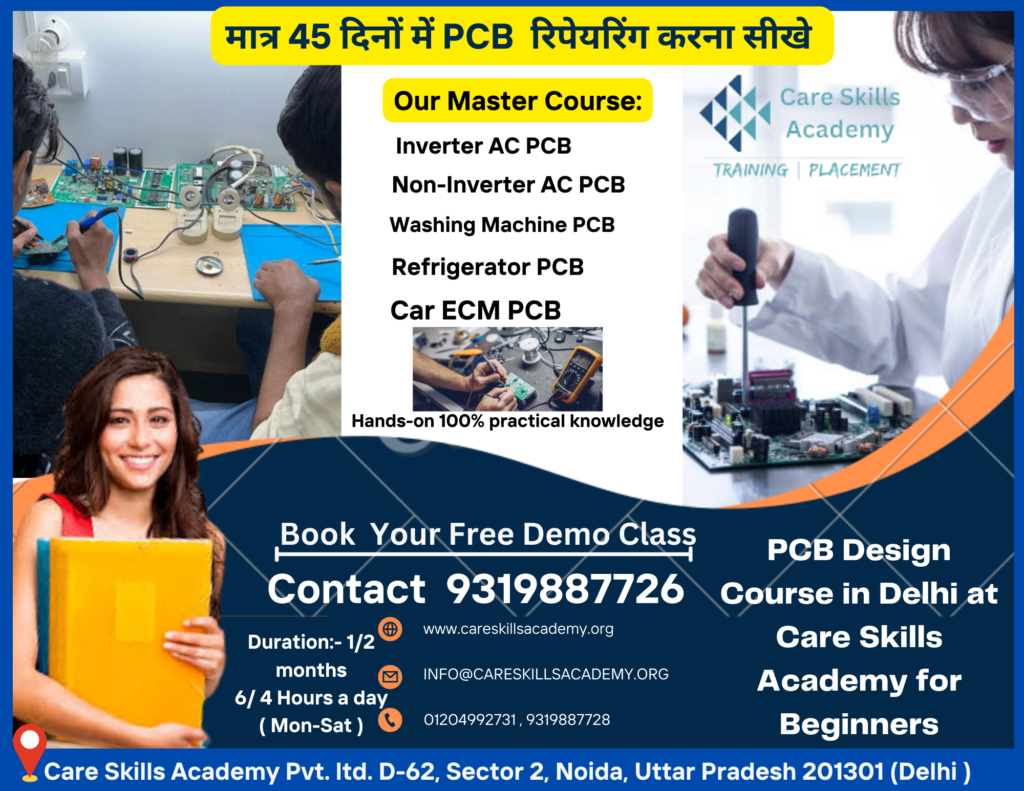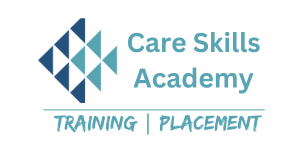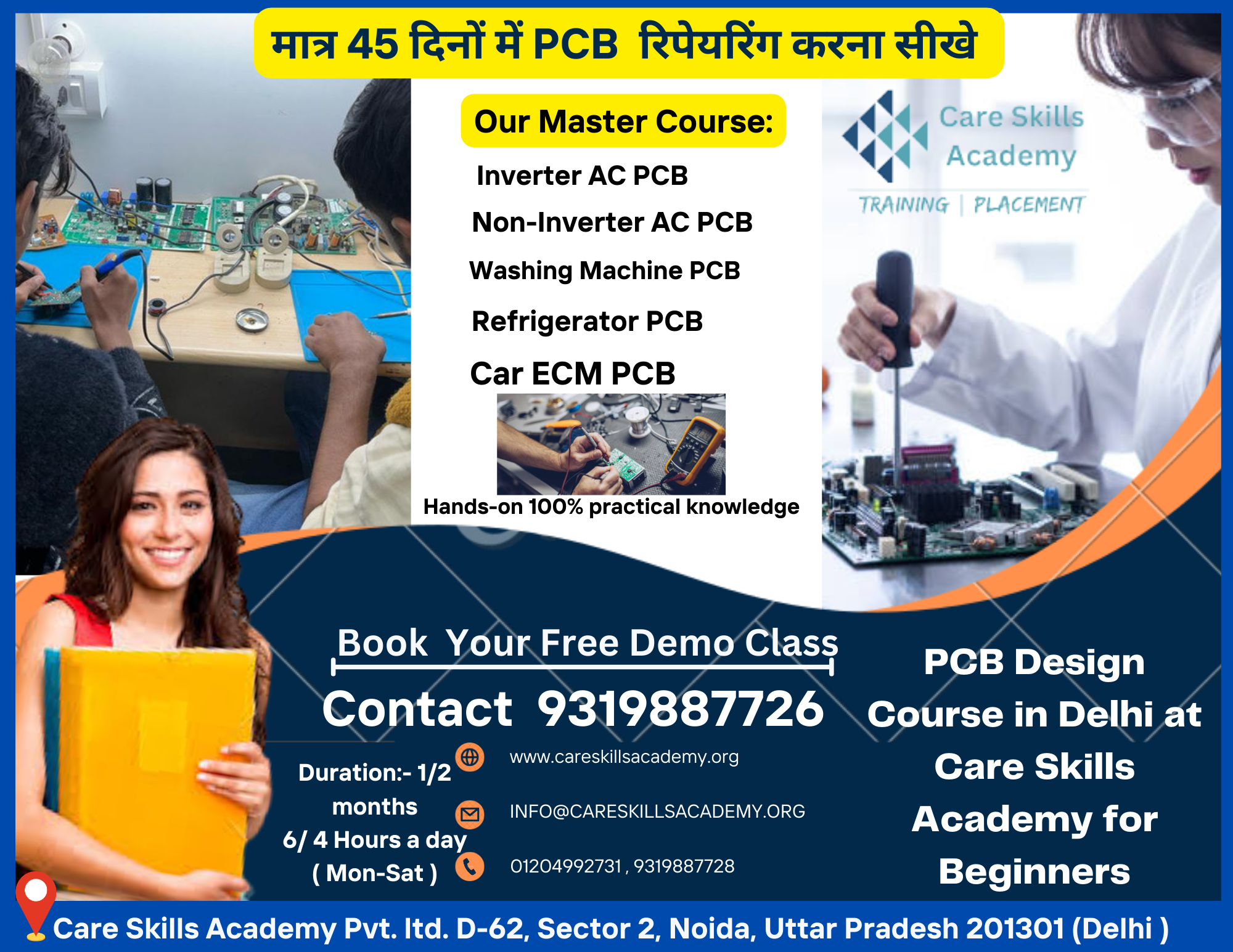Hi, if you are interested in Electronics and PCB Design, this course is for you.
Care Skills Academy in Delhi may be a great fit for you. as a bit of a beginner
With no experience in PCB design, starting with a structured course is a smart way to go.
Develop your skills in this area. Care Skills Academy instructors have years of experience
Know the industry experience and their content when it comes to teaching INS
Out of PCB design. In just a few weeks, you’ll have practical practice using all of these
Standard design software and tools. By the end, you’ll have the confidence to move forward
Create your own PCB design projects and even build a career in electronics. stay around
Find out more about what the course involves and why it is worth your time and investment
As someone new to the PCB world..
Introduction to PCB Design Course in Delhi at Care Skills Academy
This introductory PCB design course provides an overview of printed circuit board
(PCB) design using industry-standard design tools. For a few days,
you’ll learn PCB design from the ground up, starting with the basics before moving on
to more advanced topics.
The course begins with an introduction to PCBs, including materials, fabrication
processes, and design rules. You’ll then dive into design software like Altium Designer
or OrCAD to create your first simple PCB. ###Schematic capture comes next, where
you’ll learn how to develop circuit diagrams that provide the logical design for your
PCB.
PCB layout
follows, teaching you how to transfer the schematic into a board outline with
components and traces. You’ll discover how to efficiently place components, route
traces, and verify your design.
More advanced topics include:
- High-speed PCB design rules for signal integrity
- Layer planning for complex boards
- Designing for manufacturability (DFM) and assembly (DFA)
- Using 3D views and simulations to check for interferences
Throughout the course, you’ll complete hands-on exercises to reinforce what you’ve
learned. By the end, you’ll have developed PCBs of increasing complexity, gaining the
skills and confidence to design PCBs for real-world electronic devices.
Whether you’re new to PCB design or looking to improve your skills, this course
provides a comprehensive introduction to the tools and techniques used by
professionals. Taught by experienced engineers, the PCB design course in Delhi at
Care Skills Academy is ideal for beginners and hobbyists looking to turn their circuit
ideas into custom PCBs.
Key Topics Covered in PCB Design Training at Care Skills Academy
Schematic Capture
The first step to designing a PCB is creating the schematic diagram. In this module,
you’ll learn how to use design software like Altium Designer to develop digital
representations of components and how they connect electronically. You’ll become
familiar with placing resistors, capacitors, integrated circuits, and other parts and
wiring them together.
Layout Design
With a schematic in hand, you now need to arrange the physical components on a
board. The layout design involves determining the optimal placement of parts based on
connectivity and space requirements. You’ll learn design rules for appropriate trace
widths, clearance distances, sizes, and more to ensure your board can be
manufactured reliably.
Routing
Connecting all the components in your layout ¡s routing. This involves creating copper
traces to carry signals between parts. You’ll learn how to route traces efficiently while
maintaining appropriate impedance and avoiding interference. By the end of this
module, you’ll be able to route complex boards with hundreds of connections.
Design Rule Checks
Even experienced designers make mistakes, so running design rule checks is critical
step. These automated checks analyze your board against a set of constraints to find
any errors that could cause problems during manufacturing or operation. You’ll learn
how to configure design rules and run comprehensive checks to validate your PCB
before sending it off for fabrication
.
Manufacturing Outputs
The final module covers generating the necessary outputs to have your board
fabricated and assembled. You’ll learn how to create detailed drawings, bills of
materials, assembly drawings, and files in standard formats like Gerber and IPC-2581.
With the training from this program, you’ll have the skills to take a design from concept
through to a finished, fully functional PCB.
The PCB design course at Care Skills Academy covers all the essential skills you need
to become an entry-level PCB designer. With hands-on practice and guidance from
industry experts, you’ll learn best practices to design, layout, and validate complex
PCBs.

Career Opportunities After Completing PCB Design Course in Delhi
Completing a PCB design course opens up exciting new career paths in electronics
industry. With the skills you’ll gain, you can land jobs such as:
PCB Designer
As a PCB designer, you’ll be responsible for creating the actual physical layout of a
circuit board. This involves determining the placement of components and routing
copper connections between them. PCB designers typically work for electronics
manufacturing companies, earning a median salary of over $65,000 per year in the US.
Electronics Engineer
If you want to get more involved in the actual circuit design process, you can pursue a
career as an electronics engineer. Electronics engineers design, develop, test, and
oversee the production of electronic equipment such as communications systems,
industrial control systems, and consumer electronics. According to the US Bureau of
Labor Statistics, electronics engineers earn a median pay of over $105,000 annually.
CAD Technician
CAD (Computer-Aided Design) technicians use software to create schematics, layouts,
and 3D models of products. As a CAD technician specializing in PCB design, you’ll
develop diagrams and plans for circuit boards and other electronic components. CAD
technicians typically work for engineering and manufacturing firms, earning around
$50,000 per year on average.
Other jobs you’ll be qualified for include field application engineer, systems engineer,
and research and development engineer. The opportunities are vast in the burgeoning
electronics and technology sectors. A PCB design course builds a strong foundation in
skills that will be useful across various technical roles. With some experience, you can
advance into leadership positions like project manager, department head, or CTO.
The key is just getting started. Enroll in a comprehensive PCB design course, work
hard to gain the necessary knowledge and skills, and the exciting career of your
dreams can be within your reach. The future is wide open
Conclusion
And there you have it – a quick overview of the PCB design course at Care Skills
Academy. As you can see, it’s a great option if you’re looking to pick up this useful skill.
The experienced instructors, hands-on learning, and focus on both theory and
practical application means you’ll finish with a well-rounded understanding of PCB
design. Plus, the convenient Delhi location and flexible timing make it easy to fit the
course into your schedule. So if you’ve been thinking about expanding your
engineering knowledge or preparing for a career in this field, be sure to check out Care
Skills Academy’s PCB design program. This course can give you the boost you need to
get started designing your own circuit boards. Just imagine the cool devices you could
create!

